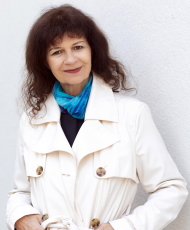Professor of culture and religious studies, she currently teaches at the Institute of European Studies of the Jagiellonian University and in 2008-2016 was the Director of the Center for Holocaust Studies at the Jagiellonian University. She was a recipient of the Irena Sendler Memorial Award of the Taube Foundation for Jewish Life and Culture in 2012 along with Prof. Maria Janion. She was a Fellow of the Kosciuszko Foundation (2018/2019) at the Graduate Theological Union in Berkeley, CA, 2011/2012 Ina Levine Invitational Scholar at the United States Holocaust Memorial Museum, and previously a Pew Fellow at the Center for the Study of Human Rights at Columbia University, a visiting fellow at Oxford University and Cambridge University, and a DAAD fellow at the Memorial and Educational Site House of the Wannsee Conference.
- Ambrosewicz-Jacobs, Jolanta, and Adam Musiał. “Findings by Country : Findings from the Polish Sample.” In Sites of Tension : Shifts in Holocaust Memory in Relation to Antisemitism and Political Contestation in Europe : Research Report, edited by Nurit S. Novis-Deutsch, Shmuel Lederman, Tracy Adams, and Arieh J. Kochavi, 259–78. Haifa : The Weiss-Livnat International Center for Holocaust Research and Education, 2023.
- Ambrosewicz-Jacobs, Jolanta. “The State of EaH by Country : A Literature Review : EaH in Poland.” In Sites of Tension : Shifts in Holocaust Memory in Relation to Antisemitism and Political Contestation in Europe : Research Report, edited by Nurit S. Novis-Deutsch, Shmuel Lederman, Tracy Adams, and Arieh J. Kochavi, 230–34. Haifa : The Weiss-Livnat International Center for Holocaust Research and Education, 2023.
- J. Ambrosewicz-Jacobs, Islands of Memory: The Landscape of the (Non)Memory of the Holocaust in Polish Education from 1989 to 2015, Jagiellonian University Press, Kraków 2020, p. 488.
- M. Eckmann, D. Stevick and J. Ambrosewicz-Jacobs (eds.), International Holocaust Remembrance Alliance: Research in Teaching and Learning about the Holocaust. A Dialogue Beyond Borders, IHRA series, vol. 3, Metropol, Berlin 2017, p. 409.
- J. Ambrosewicz-Jacobs, Czy jest szansa na spotkanie edukacji o Holokauście i edukacji o prawach człowieka? [in:] A. Bartuś, P. Trojański (red.), Auschwitz a zbrodnie ludobójstwa XX wieku, Państwowe Muzeum Auschwitz-Birkenau, Fundacja na Rzecz MDSM, Oświęcim 2012, p. 260-266.
- J. Ambrosewicz-Jacobs, Świadomość Holokaustu wśród młodzieży polskiej po zmianach systemowych 1989 roku, [w:] F. Tych, M. Adamczyk-Garbowska (eds.), Następstwa zagłady Żydów. Polska 1944-2010, Wydawnictwo UMCS, Żydowski Instytut Historyczny, Lublin 2011, p. 625-660.
- J. Ambrosewicz-Jacobs (eds.), The Holocaust. Voices of Scholars, The Center for Holocaust Studies, The State Museum Auschwitz-Birkenau and Austeria, Kraków 2009, p. 297.
- J. Ambrosewicz-Jacobs, K. Oleksy (red.), Pamięć. Świadomość. Odpowiedzialność. Remembrance. Awareness, Responsibility, Międzynarodowa konferencja z okazji 60. rocznicy utworzenia Muzeum, Oświęcim, 2-4 lipca 2007, Państwowe Muzeum Auschwitz-Birkenau, Oświęcim 2008, p. 403.
- J. Ambrosewicz-Jacobs, K. Oleksy i P. Trojański (ed.), Jak uczyć o Holokauście i Auschwitz. Materiały dydaktyczne, Międzynarodowe Centrum Edukacji o Auschwitz i Holokauście, Państwowe Muzeum Auschwitz-Birkenau, Krakόw 2008, p. 311.
- C. Durham, S. Ferrari, J. Ambrosewicz-Jacobs et al., Toledo Guiding Principles on Teaching about Religions and Beliefs in Public Schools, ODIHR Advisory Council of Experts on Freedom of Religion or Belief, OSCE/ODIHR, Warszawa 2007, p. 129.
- J. Ambrosewicz-Jacobs, Tolerancja. Jak uczyć siebie i innych, Biblioteka Willi Decjusza, Kraków 2003, ed. 2 Kraków 2004, p. 102
- J. Ambrosewicz-Jacobs, Me Us Them: Ethnic Prejudices Among Youth and Alternative Methods of Education. The Case of Poland, Kraków, Universitas 2003, p. 325.
- J. Ambrosewicz-Jacobs, L. Hońdo (ed.), Dlaczego należy uczyć o Holokauście? Katedra Judaistyki UJ, Kraków 2003, p. 106 (extended edition), Instytut Europeistyki UJ, p. 152.
- Sites of Tension - Shifts in Holocaust Memory, Antisemitism, and Political Contestation in Europe, University of Haifa, Izrael, 2020-2023. Member of the research team.
- Islands of Memory, Kosciuszko Foundation, USA, 2018-2019. Project Manager.
- Research in Teaching and Learning about the Holocaust. A Dialogue Beyond Borders. International Task Force for Holocaust Education, Remembrance and Research, 2015-2017. Member of the Steering Committee.
- Landscapes of (non) memory: The Holocaust and coming to terms with national history and identity in education in post-1989 Poland and the wider world, USHMM, USA, 2011-2012. Project Manager.


